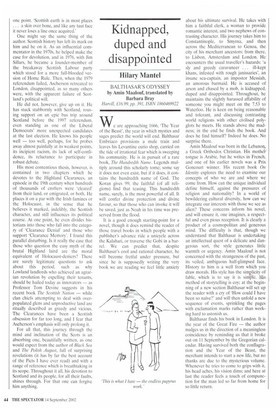Kidnapped, duped and disappointed
Hilary Mantel
BALTHASAR'S ODYSSEY by Amin Maalouf, translated by Barbara Bray Harvill, f16.99, pp. 391, ISBN 1860469922 We are approaching 1666, 'The Year of the Beast', the year in which mystics and sages predict the world will end. Balthasar Embriaco provisions a mule train and leaves his Levantine curio shop, carried on the tide of irrational fear which is sweeping his community. He is in pursuit of a rare book, The Hundredth Name. Legends multiply around this scholarly tome; some say it does not even exist, but if it does, it contains the hundredth name of God. The Koran gives 99; the faithful (of all religions) find that teasing. This hundredth name, surely, is the most powerful of all. It will confer divine protection and divine favour, so that those who can invoke it will be saved, just as Noah in his time was preserved from the flood.
It is a good enough starting-point for a novel, though it does remind the reader of those travel books in which people with a publisher's advance ride a unicycle across the Kalahari, or traverse the Gobi in a barrel. We can predict that, despite Balthasar's cool and rational character, he will become fretful under pressure, but since he is supposedly writing the very book we are reading we feel little anxiety about his ultimate survival. He takes with him a faithful clerk, a woman to provide romantic interest, and two nephews of contrasting character. His journey takes him to Constantinople, to Smyrna, and then across the Mediterranean to Genoa, the city of his merchant ancestors: from there. to Lisbon, Amsterdam and London. He encounters the usual traveller's hazards: 'a sly and greedy caravaneer ill-kept khans, infested with rough janissaries', an insane sea-captain, an impostor Messiah, an amorous barmaid. He is accused of arson and chased by a mob, is kidnapped, duped and disappointed. Throughout, he maintains the slightly harassed affability of someone you might meet on the 7.53 to Waterloo. He is keen on being reasonable and tolerant, and discussing contrasting world religions with other civilised polyglots he meets. He stands above the madness; in the end he finds the book. And does he find himself? Indeed he does. No surprise there.
Amin Maalouf was born in the Lebanon, a Greek Orthodox Christian. His mother tongue is Arabic, but he writes in French, and one of his earlier novels was a Prix Goncourt winner. His recent book On Identity explores the need to examine our concepts of who we are and where we come from. How can the unique individual define himself, against the pressures of religion and nationality? In a world of bewildering cultural diversity, how can we integrate our interests with those we see as alien? These concerns inform his novel, and will ensure it, one imagines, a respectful and even pious reception. It is clearly a product of a cosmopolitan and generous mind. The difficulty is that, though we understand that Balthasar is undertaking an intellectual quest of a delicate and dangerous sort, the style generates little warmth or urgency. Amin Maalouf is not concerned with the strangeness of the past, its veiled, ambiguous half-glimpsed face. History to him is a well from which you draw morals. His style has the simflicity of fable, which is to say it is simple. His method of storytelling is coy; at the beginning of a new section Balthasar will set up the reader with a cry of 'How could I have been so naïve?' and will then unfold a new sequence of events, sprinkling the pages with exclamation marks rather than working hard to astonish us.
Balthasar finds his book in London. It is the year of the Great Fire — the author nudges us in the direction of a meaningless coincidence by reminding us that it broke out on 11 September by the Gregorian calendar. Having survived both the conflagration and the Year of the Beast, the merchant intends to start a new life, but no thanks are due to the mysterious volume. Whenever he tries to come to grips with it, his head aches, his vision dims; and here at last the reader feels a touch of compunction for the man led so far from home for so little return.










































































 Previous page
Previous page